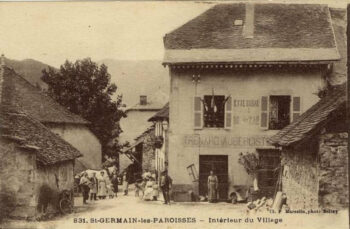Marist Spirituality An Introduction – Part 3

By Fr David Kennerley SM
Bugey Mountain Villages: 1825-29
Bugey:
Instrument of Mercy to Others
In 1823, the diocese of Belley was created in a largely mountainous corner of the diocese of Lyon. The new diocese included Cerdon, the parish of the two Colin brothers. Bishop Devie had very few priests and yet large parts of his new diocese were suffering from long years of pastoral neglect. Many people, especially in the isolated Bugey, had abandoned the Church and were even hostile towards it. Bishop Devie’s response, like many other bishops in France then, was to introduce missions. So, something that the aspiring Marists had dreamt of doing in the seminary, was now actually asked of them. A particularly graced coincidence.
 Jean-Claude Colin was horrified at first, thinking that he personally was quite unsuitable. However, he was equally convinced that this was something Mary wanted and he and the other Marists assigned the task had to put their trust in her and endeavour to be her presence to these people. And so, the Bugey missions reinforced for Marists that their spirituality is less about prayers and devotions and more to do with us noticing, accepting, attuning ourselves to think, judge, feel and act as Mary in all things.
Jean-Claude Colin was horrified at first, thinking that he personally was quite unsuitable. However, he was equally convinced that this was something Mary wanted and he and the other Marists assigned the task had to put their trust in her and endeavour to be her presence to these people. And so, the Bugey missions reinforced for Marists that their spirituality is less about prayers and devotions and more to do with us noticing, accepting, attuning ourselves to think, judge, feel and act as Mary in all things.
As was expected, the Marist ‘catechists’ as they called themselves were frequently met with apathy, suspicion and hostility. On occasion, their missions began with only one or two people present. However, by respectfully and carefully getting alongside the villagers in the typical three weeks of a mission, almost inevitably, they saw the church fill!
It wasn’t as if these results came easily! To start with, the only feasible time for missions were the harsh winter months when the snow-bound people had to forgo work on their farms, and instead, took to spinning wool or lace-making at home. The snow and the cold also meant that just getting to the villages was taxing and difficult.
 At a human level, the team of two, at most three catechists, began by recognising that they were no better than those to whom they were sent. Uppermost for them was the image of Mary as a mother wanting to reach out and help the child who was hurting the most. This encouraged the Marists to do all they could to speak to the hearts of people, not bash them about with Commandments or regulations.
At a human level, the team of two, at most three catechists, began by recognising that they were no better than those to whom they were sent. Uppermost for them was the image of Mary as a mother wanting to reach out and help the child who was hurting the most. This encouraged the Marists to do all they could to speak to the hearts of people, not bash them about with Commandments or regulations.
But at the human level, these first Marists had quite contrasting, even clashing personalities. They weren’t necessarily easy ‘bed-fellows’ and at times they indeed had to share the same bed! On the other hand, they noticed that there was a certain strength in their differences because some people in each village were more inclined to one missioner than to another. In short, while striving to evangelise the villagers, the missioners allowed themselves to be evangelised and formed as well!
Given so many obstacles, our early Marists quickly came to see that prayer was the absolute key to the turn-around in people and to any good they achieved. So crucial did they see prayer that in addition to their own many prayers, they made a point of asking others to pray for them and the villagers to whom they were sent as “instruments of God’s mercy.”
As Bishop Devie noticed, the turn-around achieved by the Marists was often in stark contrast to other mission bands working in supposedly more favourable territory. The Marists did their best, and with that done, grace and Mary did the rest.
A Prayer to Mary
Mary, our Mother and Guide, stir within us a love for those who feel lost, outcast, or estranged from your Son and His Church that we may hold them in prayer and be your gentle presence of Divine mercy toward them.
Help us build one another up in Christ and support His Body in all the circumstances of our lives. May we always know your help as we commit our lives, families, communities and world to your care.
An historical extract
“We used to pray, and we had others pray; that is what I would like for us to remember well. If we should happen to forget the spirit of prayer, we will forget the very basis for success in the missions.
We always began the mission with the little children. The catechist would ask them if they wanted to choose the Blessed Virgin as their advocate, their protectress. He then told them to ask pardon of their parents for all their acts of disobedience. After that he would ask the parents to retract all the curses that they had unfortunately pronounced against their children. Then he would invite the parents to extend their hands over their children and the pastor and missioners, with their hands extended, would consecrate all these children to the Blessed Virgin.
In the first mission we stirred up the whole parish by doing so, and I don’t believe there was a single inhabitant left who was not won over.”
Fr. Colin, 1844
A Contemporary Marist Writes
“In the theology of the day, God was a demanding God of justice and atonement rather than a God of love and infinite mercy. The rigourist approach then in vogue in France was what Colin had learned at the seminary and one of its characteristics was either to delay giving absolution or to refuse it altogether. Yet Colin wrote later, ‘On account of poor human nature, the Society of Mary shall profess all those opinions which leave most scope to God’s mercy.’ The importance of the change in confessional approach cannot be overstated.”
Donal Kerr, Jean-Claude Colin, Marist, pp.225-26
Bugey is a ‘defining event’ because the first Marists came to share a yearning to bring the Gospel as Good News to forgotten people.
QUESTIONS TO PONDER
1. Have you ever done something you didn’t want to and it turned out to be great!
What does that say about us, but also about grace?
2. The freezing weather taxed the Marists just as a lack of human warmth can also affect people. What would you need so as to persevere in such a situation?
3. What is the message of the Bugey for us in our days?
The Call of Bugey for Marists Today
1. To be able to forget one’s own interests in order to respond to those in need.
2. To recognise the Gospel as God’s Good News.
 Entries(RSS)
Entries(RSS)